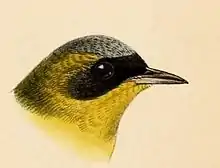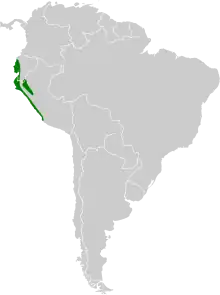Black-lored yellowthroat
The black-lored yellowthroat (Geothlypis auricularis) is a New World warbler. It has a number of separate resident breeding populations in South America from western Ecuador to western Peru. It was previously considered a subspecies of the masked yellowthroat.
| Black-lored yellowthroat | |
|---|---|
 | |
| Scientific classification | |
| Domain: | Eukaryota |
| Kingdom: | Animalia |
| Phylum: | Chordata |
| Clade: | Dinosauria |
| Class: | Aves |
| Order: | Passeriformes |
| Family: | Parulidae |
| Genus: | Geothlypis |
| Species: | G. auricularis |
| Binomial name | |
| Geothlypis auricularis Salvin, 1883 | |
 | |
The breeding habitat is marshes and other wet areas with dense low vegetation.
The black-lored yellowthroat is usually seen in pairs, and does not associate with other species. It is often skulking, but may pop up occasionally, especially to sing. It feeds on insects, including caterpillars, dragonflies, damselflies, grasshoppers and beetles, and spiders,[2] which are usually captured in dense vegetation. The call is a fast chattering, quite unlike that of other yellowthroat species, and a more typical sharp chip.
References
- BirdLife International (2017). "Geothlypis auricularis". IUCN Red List of Threatened Species. 2017: e.T103795612A119461785. Retrieved 13 November 2021.
- https://sta.uwi.edu/fst/lifesciences/sites/default/files/lifesciences/documents/ogatt/Geothlypis%20aequinoctialis_Masked%20Yellowthroat.pdf
- New World Warblers by Curson, Quinn and Beadle, ISBN 0-7136-3932-6
- Birds of Venezuela by Hilty, ISBN 0-7136-6418-5
- ffrench, Richard (1991). A Guide to the Birds of Trinidad and Tobago (2nd ed.). Comstock Publishing. ISBN 0-8014-9792-2.
- A guide to the birds of Costa Rica by Stiles and Skutch ISBN 0-8014-9600-4
